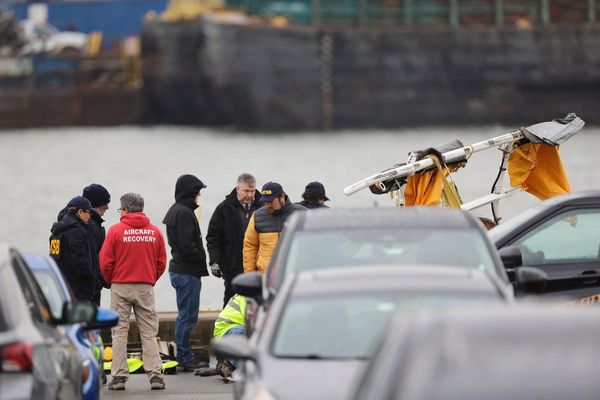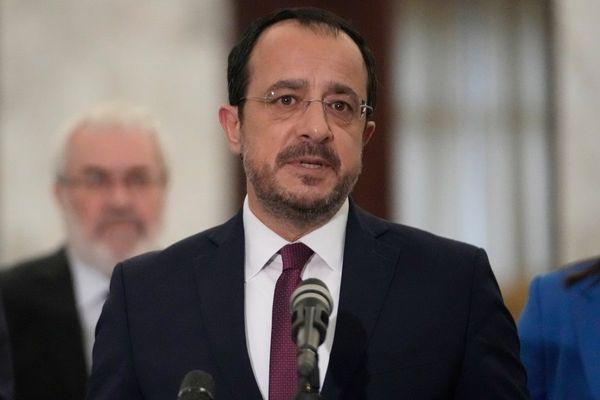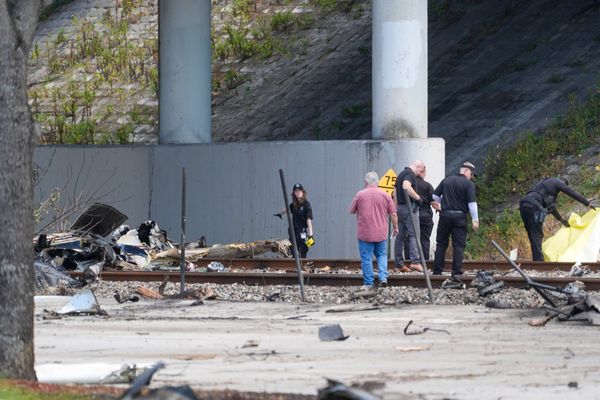
Many broadcasters privately express fears of format exhaustion: that everything has been tried, dooming them to revive ever more old shows. So it’s a relief to find among the contenders for the 2023 Bafta television awards a genuine, fresh, must-see show: BBC One’s The Traitors, a mind game in a Scottish castle, which may feel 100% betrayed if it doesn’t win the award for entertainment performance for Claudia Winkleman, and the most famous fringe since Edinburgh’s.
Her show is a strong contender for reality and constructed factual, one of the newest and to some purists most controversial categories, but showing considerable imaginative energy. The Traitors competes with Freddie Flintoff’s Field of Dreams, a brilliant exercise in tackling social disadvantage through sport, and BBC Two’s We Are Black and British, a dinner-party format crossed with Question Time. Flintoff, a former England cricket captain, may enjoy having beaten on to the podium former England football captain David Beckham’s very similar Save Our Squad With David Beckham (Disney+).
Longevity is also honoured, though. While the organisers and broadcasters of the event are officially neutral about who wins, Bafta and BBC One – which screens the award ceremony on 14 May – will be hoping, for red-carpet dazzle, that Mick Jagger attends, after receiving a first Bafta TV nomination in best music (fiction) for his theme tune for Slow Horses. Five nominations for that Apple TV+ adaptation of Mick Herron’s novels about low-achieving spies sees the IT pioneer’s television arm challenging giants such as the BBC and Netflix.
But, among televisual veterans, the outstanding performer is the late Queen Elizabeth II. She has in effect three individual nominations – for Imelda Staunton’s portrayal of her in Netflix’s The Crown, plus the BBC’s programming around the platinum jubilee last June and the state funeral in September.
The listing of both the BBC royal specials in the director: multi-camera and the live event categories gives a jury one of those absurd Bafta dilemmas about whether the visuals are better in the one where the leading lady is alive or dead.
If one aspect of diversity is the ability to recognise both longstanding talent and absolute beginners, these nominations largely achieve it. Alongside the late queen and a living king of rock music is a writer: drama award in which all four contenders are first-time nominees: Adam Kay (This Is Going to Hurt), Alice Oseman (Heartstopper), Pete Jackson (Somewhere Boy) and Tony Schumacher (The Responder). Other new writers – Jack Rooke (Big Boys) and Nicôle Lecky (Mood) – are recognised in the comedy and emerging talent lists, suggesting the arrival of a powerful new group of screenwriters. However, as the shows range from original projects to versions of existing books, Bafta may want to consider following other ceremonies in distinguishing between original drama and adaptation.

After a period in which brief culture secretary Nadine Dorries tried to privatise it, Channel 4 can feel proud that its relatively small drama and comedy output has, with Somewhere Boy and Big Boys, matched the performance of more prolific producers.
In the drama categories, jurors seem to have resisted the fictionalising of troubling recent real-life cases, which has penalised ITV, the market leader in that brand. Writer-producer Jeff Pope can feel especially aggrieved that The Walk-In is ignored, while Pope’s BBC collaboration with the writer Neil McKay, Four Lives, is also overlooked.
Both series dealt with unsettling material – the infiltration of a British neo-Nazi group by a racist turned whistle-blower, and a serial killer targeting gay men – and the overlooking of these shows may revive concerns, inside and outside the Academy, that some voters are wary of seeming to endorse disturbing situations by giving prizes to them. The two most honoured mainstream dramas – This Is Going to Hurt and The Responder – depict the mental collapse of a doctor and a cop, let down by their institutions. Those issues are real and important, but can invite what might be called slogan voting. Recent governments, which have made access to drama schools harder, should note the astonishing firepower across the acting categories.
Several categories have only three nominees, rather than the four or six in others. This reflects a Bafta rule that, in categories with fewer than 20 entries, only a trio can be chosen. These may therefore identify areas in which activity is declining – such as daytime, from which broadcasters have withdrawn money to fund digital projects; soap and continuing drama, single drama; and, perhaps surprisingly, sports and news.
As there was no obvious lack of geopolitical or athletic incident in 2022, the lower ambition for trophies in those last two categories may result from an unease among broadcasters about judging two different presentations of the same game or race; or, in journalism, going up and gloating in your best clothes thanks to your angle on a war or other catastrophe being judged better than a rival’s.
In this respect, the factual sections suggest mature judgments. While the Baftas inevitably reflect the year’s events, there are only four listings directly addressing the war in Ukraine – possibly because of the continuing volatility of the conflict – but to the credit of commissioners and Bafta voters, there is recognition for a mass of fascinating deeper historical context: including Adam Curtis’s extraordinary BBC iPlayer archive deep-dive, Russia 1985-1999: Traumazone; ITV and Channel 4 documentaries about Afghanistan and Sky’s Chernobyl: The Lost Tapes.
That retrospective emphasis is fitting for a year drenched in history. The director of the BBC One live event in May will hope for poignant cutaways to the Prince of Wales, Bafta’s president, as the TV industry pays its final respect to his grandmother.







